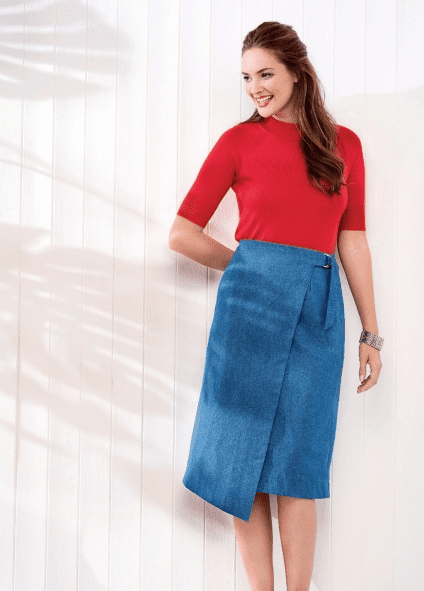Your Dressmaking Toolkit: Tips and Tricks for a Perfect Me-Made Wardrobe
dressmaking, sewing, techniques, tips
2020

If you’re anything like us, you’ll be constantly on the lookout for more handy tips and tricks to add to your sewing arsenal. The sheer volume of different things to learn when it comes to dressmaking can be a little overwhelming – that’s why we’ve put together a handy rundown of some must-have skills. Even if you’re a seasoned pro with years of experience under your belt, a little reminder of the basics can’t hurt!
ZIP TIPS

A well-executed zip always gives a professional look to your garments, and proper marking, positioning and tacking will help you to achieve this. Our top tip is to buy a zip 5cm longer than required. Placing the top of a zipper above its opening takes the tab out of the line of stitching, so sewing can continue easily. Once the zipper is fixed, the extra portion can then be removed.
When pinning in a closed-end zip, the start of the teeth should sit just below the start of the front seam. If the zip is too long, ensure the excess is at the waist edge, so it can be trimmed off after the waistband is attached.
If you are using a concealed zipper foot, place the teeth of the zip into the groove before you begin. As you stitch, the foot will uncurl the teeth and the stitching will appear alongside the teeth. If you are stitching with a normal zipper foot, you will need to uncurl the teeth with your fingertips as you go; sew to the top of the side seam.
PRETTY PLEATS

For perfectly formed pleats, first work out where you need to position the pleats, ensuring that they are evenly spaced. Fold and pin them, then press to flatten. Make sure the pleats are close to the folded edge and are 1cm above the waistband seam before sewing across the top to secure. To create an inverted pleat, pinch and crease the fabric on either side of the centre line to meet in the middle, then pin. Hand-sew the width of the pleat to secure it near or on the stitching line, then press.
BUTTON BASICS

A sewing gauge is a great tool for getting the perfect placement when it comes to sewing buttons. You could also use a piece of scotch tape to hold the button in place; simply stitch through the tape and tear away once you’re happy with where it sits.
INTERFACING INFO

Interfacing is commonly used to stabilise areas such as necklines, waistlines and button positions. Fusible interfacing is a variation that contains a heat reactive glue coating which can be ironed on to fabric quickly and smoothly. Before you apply interfacing to the main fabric, do a test on a scrap to check that the interfacing weight allows for the right amount of shaping. If the result is too stiff, try a lighter weight; if it’s too flimsy, opt for a heavier version.
When applying interfacing to fabric, be careful if you need to apply heat to another area. Lift the iron and set it down; if you glide it, the fabric and interfacing may shift and stick to the ironing board cover. Leave to cool completely before moving so that the glue has time to set and stick to the fabric.
CUT LIKE A PRO

While you may be familiar with cutting cotton, other fabrics need a little more care when going under the chop. Fabrics that contain elastane need to be cut out and handled gently. If any of the pattern pieces are stretched out of shape when you stitch, this will cause your garment to look distorted. To avoid this, make sure there’s plenty of space for the material to be fully supported.
Denim, on the other hand, is a thick fabric, so to make life easier when cutting out pattern pieces, you should use a sharp pair of scissors or add a new blade to your rotary cutter. Depending on how thick the denim is, you may want to cut through just one layer at a time, and you might also need to upgrade to stronger pins, too.
If it’s faux fur that you’re working with, you’ll need to take a few extra steps. Before taking your scissors to the fabric, make a note of the direction of the fur – it should be laying down. Make sure the nap on your pattern pieces is facing the same way to ensure your garment looks even once it's all stitched up.
You can find loads more fab tips, tricks and techniques in our How To Sew section - then, put your newfound knowledge to the test and check out the huge range of free dressmaking, accessories, homeware and gift projects we have to offer!
New this week

Creative Book Awards 2026: Shortlist Unveiled
26 Jan 2026
Welcome to the Creative Book Awards 2026! Since launching in 2021, these awards…
_Crafthive_Sew_Website_Blog_-_21.9.25_Header_.jpg)
Discover Stitchtopia Sewing Holidays Today
21 Sep 2025
For expert-led sewing holidays, choose Stitchtopia! Why? Let’s read on… If you love sewing,…
.jpg)
Celebrate Your Love Of Sewing With These Perfect Patterns
2 May 2025
[includes sponsored content] We love sewing. We do. We love everything about it, whether…
